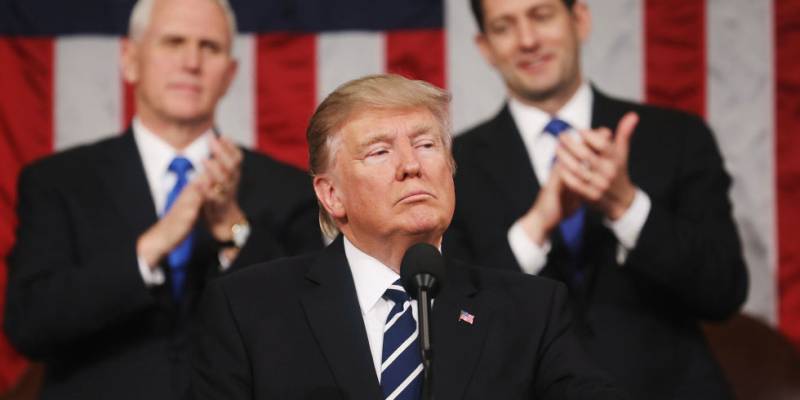Iran has finally responded to Trumps speech. Iranian diplomat Bahrain Gosemi has issued a statement condemning the Trumps strategy of continuing their presence in Afghanistan. He remarked that, “American opportunist strategies, unilateral policies, and unacceptable interference have resulted in increasing chaos and tensions and growing tensions and extremism in the region”. But, for America such interferences and meddling in foreign affairs is no big deal. Ever since 1917, when America started actively participating in the global politics, number of its presidents have continuously reminded the world that collateral damage and repercussions of its policies are perfectly acceptable as long as they can serve American interests.
Henry Kissinger stated in his book diplomacy, “If the world truly wants peace, it needs to apply America’s moral prescriptions”. This is unbelievable statement considering that Madeline Albright, a former secretary of the State, when asked about the death of half a million children in illegitimate Iraq war, remarked in an interview that ‘I think it’s a very hard choice, but we think it was worth it’.
This is a more or less similar mind set which was once demonstrated by the regime of Adolf Hitler, when German Army mounted a surprise attack on Soviet Union. According to Bundesarchive-Militararchive, Herbert Backe had advised Hitler that; Ukraine was the key for Germany having rich and vast agricultural plains which ran across the North of the Black Sea and on past the Caspian, which could ‘liberate us from every economic pressure’. War planners had divided Russia into surplus and deficit zone and scheduled to divert the grains from surplus zone in to Russia while, for deficit zone it was to cut off from mainland and it was categorically stated that how would it survive was of a little concern to Germans. It meant putting lives of millions of people on stake as a collateral damage.
According to the research conducted by the Oxford academic Peter Frankopan, the plan was to move along the so-called 'surplus area' which was resource rich, while purposely abandoning the 'deficit areas' which could potentially resulted in the millions of death due to food shortage. During the prolonged invasion, clear preferences were given to German people over Russians. Though, Germans failed to make decisive inroads in Russia, but those mercilessly killed in prisons were called a collateral damage. Actions of Americans today resonate the Germans of yesterday.
German advances in Russia were based on taking control of the resources in areas now of modern day Ukraine having great fields and Southern Russia stretching all the way to east. Is there any difference between today’s America and yesterday’s Britain, Russia and Germany? Didn’t they all go completely berserk in their respective great games to extend their territories or attain control of resources (minerals and grains)? Germany expected to shun its dependence on foreign countries and according to Hitler, the best way to go about it was to invade to acquire resources. They wanted grains, petroleum, iron, manganese and other minerals to avoid future economic dependence. Similar is the case for America, it has an eye on potential resources underneath the barren land of Afghanistan.
Secondly, and most importantly, denying China a freehand to achieve its ambitious new Silk Road, which has the potential to further consolidate China’s powerful status as the biggest economic power house of the 21st century. Americans are adamant of not leaving Afghanistan as it would give leave a vacuum behind which will more likely filled by China. As China continues to spread its influence in this region, America is not willing to give a key competitor a free hand that’s why bringing India into equation as a major stakeholder serves American objectives. After Iranian revolution and continuous animosity between the two friends turned foes, in post Shah Era, Afghanistan is the realistic place for America to contain China and even Iran and Russia.
When nations value themselves as contenders to rule the world, they devise the way to mold the facts using media (in particular) to convince the stakeholders of their actions. Since, the end of World War I, America was aware of elevation in its status as a global player and like other superpowers of the time, it also set sights on resources of Asia. Though, it had achieved major objectives in Iran to some extent but, game was left unfinished after Shah’s ousting. Iraq and KSA remain in its grip. But, after losing Iran, Afghanistan and Pakistan are sighted as strategically extremely important as they potentially pose major threat the national security of America.
As Najam Sethi stated in his editorial, “Pakistan is part of the problem for the US because India is part of its solution against China while China is part of the solution for Pakistan because India is part of the problem for it”. Going forward India is indispensable to stop China and as long as India is present in Afghanistan, peace in Pakistani border regions especially Balochistan is extremely difficult and unrest in Pakistan with the help of Afghanistan and India is what US can only work for US to contain China. After seeing off Great Britain, Germany and Russia, China poses the real threat to American hegemony and control of the world. For China, seeing off America is a tough challenge, how will this great game unfolds; only time will tell.






